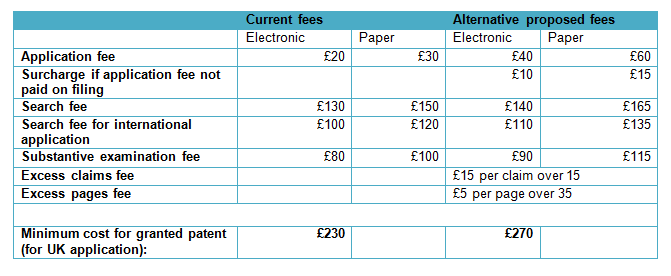 The UKIPO is currently running a consultation on proposed changes to patent fees. The fee structure is being reviewed as the Government has made a manifesto commitment to make the UK the best place in Europe to patent new ideas [IPcopy note – this consultation was opened a few days prior to the Prime Minister calling the General Election]. To support this, the IPO is investing in electronic services and increased examination capacity and therefore is considering an increase to their fees.
The UKIPO is currently running a consultation on proposed changes to patent fees. The fee structure is being reviewed as the Government has made a manifesto commitment to make the UK the best place in Europe to patent new ideas [IPcopy note – this consultation was opened a few days prior to the Prime Minister calling the General Election]. To support this, the IPO is investing in electronic services and increased examination capacity and therefore is considering an increase to their fees.
The current official fees payable in order to obtain a granted patent (which total £230*) haven’t changed since April 2010.
Which fees are the IPO considering changing?
- Increases to application fees and a surcharge if the application fee is not paid on filing
- Increases to fees for requesting search and examination
- Excess claims and excess page fees
Why these changes?
To fund the investment above, the IPO needs to ensure that costs are recovered. Each granted patent costs the IPO approximately £2500, but most of this cost is recovered post grant from renewal fees and it normally takes around 15 years to break even on the costs of a patent application.
A large proportion of work is undertaken by the IPO early on in the process, such as carrying out searches. If a business then uses these search results to decide to file outside the UK, the costs are never recovered by the IPO. By increasing the application fee and the search and examination fees, more of these costs could be recovered up front.
The consultation document also discusses the issue of low filing fees potentially encouraging poor-quality applications. These applications create a backlog and waste resources, meaning delays in the time it takes to get a granted patent. An example is given in which the IPO received 3000 applications from only 10 people in 1 year. Application fees only ended up being paid on 51 of these applications, meaning the others were abandoned, but still wasted processing time. The hope is that by increasing application fees and introducing a surcharge if the fee is not paid at the time of filing that the filing of poorly thought out applications will be discouraged.
Excess claims and pages fees are being considered to encourage people to file more succinct applications, which would also speed up processing.
However the document is keen to state that the IPO doesn’t want to change the principle of mainly recovering costs post grant and that it is the aim for the system to stay accessible and attractive to innovators.
The consultation documents discuss 2 proposals:
Proposal
(Slightly confusingly laid out in proposals 1-4 of the consultation document)
- Application fees increase and a 25% surcharge added if fees not paid at time of filing
- Fees for requesting search and examination increase
- £30 fee for each claim over 15 claims
- £10 fee for each page of description over 35 pages
In this scenario it would be possible to gain a granted patent for official fees of £310*.

Even with these proposed increases the IPO estimates that they will have recovered a maximum of 16% of processing costs at the time of patent grant.
Alternative proposal:
This proposal discusses smaller increases pre-grant and increasing fees post-grant.
- Increase pre-grant fees by half of what was suggested in the first proposal
- Increase renewal fees by £10 per each renewal fee
In this scenario it would be possible to gain a granted patent for official fees of £270*.

With the increase to renewal fees, if a business renewed their rights for the entire 20 year lifetime of a patent, it would result in an increase of £160 being paid across this time.
Fee changes would require legislative change, so the IPO estimates that neither of these proposals would happen before 1 October 2017.
Any comments can be emailed to: consultation@ipo.gov.uk.
Comments by 6 June 2017
Sarah Waterman 4 May 2017
*The fees noted above do not, of course, include any patent attorney charges and the consultation itself notes that: “In practice, attorney fees represent the vast majority of the total cost of applying for a patent. In the financial year 2014/2015, only 24% of applications were filed by applicants who did not use the services of a professional patent attorney or other patent advisor“


